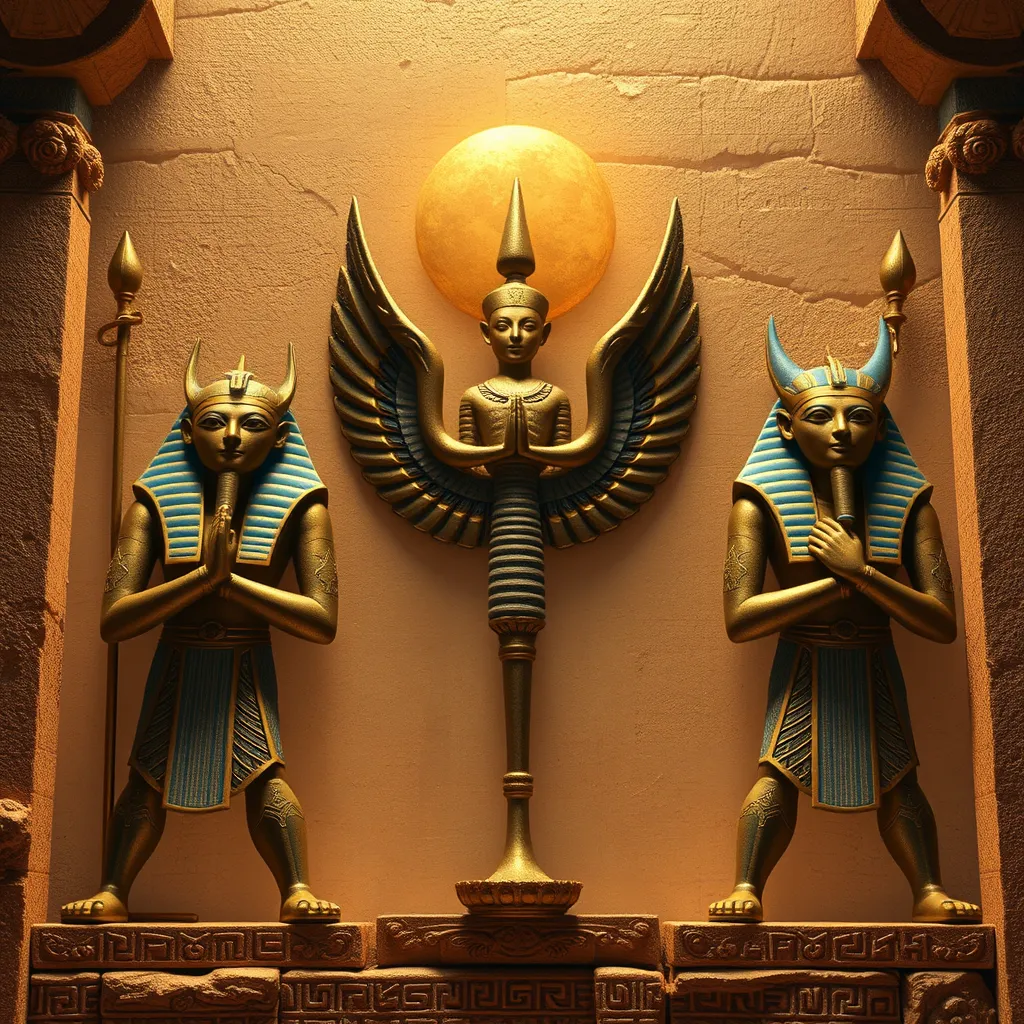The Gods of Egypt: Their Influence on Ancient Egyptian Society and Their Lasting Legacy
I. Introduction
Ancient Egyptian religion and mythology formed a rich tapestry woven into the very fabric of society. At the heart of this civilization were the gods, who were not only worshipped but also integrated into every aspect of daily life and governance. The gods served as intermediaries between the people and the divine, influencing everything from agriculture to law. This article explores the pantheon of Egyptian deities, their roles in governance, daily life, beliefs about the afterlife, and their lasting legacy.
II. The Pantheon of Egyptian Deities
The gods of Egypt were numerous and varied, each embodying different aspects of life, nature, and the cosmos. Some of the major gods and goddesses include:
- Ra: The sun god, considered the king of the gods, who traveled across the sky in his solar boat.
- Osiris: The god of the afterlife, resurrection, and fertility, often depicted as a mummified king.
- Isis: The goddess of motherhood, magic, and fertility, who was also revered for her role in protecting the dead.
- Anubis: The god of mummification and the afterlife, depicted as a jackal or a man with a jackal’s head.
- Horus: The sky god, often associated with the pharaohs, representing kingship and protection.
Each deity had specific roles and attributes associated with them. For example, Ra was seen as the creator god and the giver of life, while Osiris represented the cycle of death and rebirth. The concept of Ma’at, embodying truth, balance, and order, was central to Egyptian cosmology and linked to the divine order established by these gods.
III. The Integration of Religion and Governance
The pharaoh was viewed as a divine ruler, an earthly embodiment of the gods, particularly Horus. This divine kingship established a direct link between the governance of the land and the will of the gods, legitimizing the pharaoh’s authority.
Religious ceremonies played a crucial role in political life, reinforcing the pharaoh’s status and the stability of the regime. Major ceremonies included:
- Coronations: Rituals that marked the ascension of a new pharaoh, often involving the gods.
- Festivals: Celebrations honoring gods that symbolized the pharaoh’s connection to the divine.
Temples served as powerful centers of influence, both religiously and politically. They were not only places of worship but also economic hubs, where land was owned, and resources were managed. The priests acted as intermediaries, conducting rituals and maintaining the favor of the gods.
IV. Daily Life Under the Influence of the Gods
Religion permeated daily life in ancient Egypt. Households practiced various religious rituals, ensuring that the family’s well-being aligned with divine favor. These practices included:
- Offering food and incense to household gods.
- Reciting prayers and hymns to invoke protection and blessings.
Public celebrations and festivals, such as the Opet Festival, drew people together to honor deities, reinforcing community bonds and cultural identity. These events often featured:
- Processions with statues of gods.
- Dances, music, and feasting.
The influence of the gods extended to art, architecture, and literature. Temples, tombs, and monuments were richly decorated with depictions of deities, and stories of the gods were inscribed in hieroglyphs, conveying moral lessons and cultural values.
V. Death and the Afterlife Beliefs
Beliefs about death and the afterlife were central to Egyptian religion, with gods playing pivotal roles in guiding souls. Osiris was particularly significant as the ruler of the underworld, overseeing the judgment of the dead.
Funerary practices were elaborate and deeply connected to these beliefs. Egyptians believed that a proper burial ensured a successful journey to the afterlife. Key aspects included:
- Mummification to preserve the body.
- Tomb inscriptions providing guidance for the deceased.
The Book of the Dead, a collection of spells and prayers, was essential for the deceased’s journey, illustrating the importance of divine assistance in navigating the afterlife.
VI. The Evolution of Egyptian Religion
Over centuries, Egyptian religion evolved, adapting to changing dynasties and foreign influences. The introduction of new gods and the merging of deities were common, reflecting a syncretic culture that embraced diversity.
The rise of monotheism, particularly with the worship of Aten during the reign of Akhenaten, marked a significant shift. This radical change, however, was short-lived, and traditional polytheistic beliefs resumed after his reign.
VII. Lasting Legacy of Egyptian Deities
The influence of Egyptian gods extended beyond their time, impacting later cultures and religions. The themes of resurrection and the afterlife in Egyptian mythology can be seen in other religious traditions, including Christianity.
In contemporary culture, Egyptian deities continue to fascinate and inspire. They appear in:
- Literature, such as novels and comics.
- Films and television shows that explore ancient mythology.
- Art and fashion inspired by Egyptian motifs.
VIII. Conclusion
The gods of ancient Egypt profoundly influenced society, shaping governance, daily life, and cultural expressions. Their impact is still felt today, as modern interpretations and representations continue to captivate audiences worldwide.
Reflecting on the relevance of these deities in contemporary culture encourages a deeper appreciation for the complexities of ancient beliefs. Preserving and studying these rich traditions is essential, not only to understand the past but also to recognize the enduring human quest for meaning and connection to the divine.




